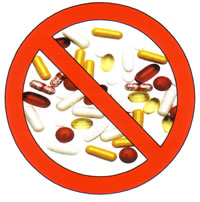
Every day at Self Serve we help women and men with sex and relationship challenges. We put a sex positive spin on peoples' outlooks. We encourage education, trying new activities and honest communication. It's amazing how these sex and relationship skills, skills no one is taught in school, can do wonders for boosting ones' sex life.
But I don't believe the latest brain drug Flibanserin can guarantee the same results.
There’s a lot of controversy surrounding Flibanserin, and it's going for approval at the FDA tomorrow. Look. It’s not that I don’t want to find a magic pill that brings women and men desire. It’s just that I know it’s not that simple. That is why I hope the FDA will vote no on this particular drug.
When the majority of women still don’t understand their own basic sexual anatomy, there are some vital steps missing when we jump to pharmaceutical solutions. That, and 6 months of research on a brain drug that offers maybe "one more sexually satisfying event" per month just isn't enough to convince me.
It's refreshing when medical research states the obvious truth. For example, one 2003 study "emphasizes the [importance of] psychological and social issues that contribute to sexual distress in women and propose that we further examine the distinction between “dysfunction” and “reaction to circumstances.” A stressed, busy, tired working woman may not get off or get turned on at the drop of a hat. Or pants for that matter. Ask any woman and she will probably confirm "circumstances" of her life are relevant to if she's in the mood.
A recent Portuguese study really hits the nail (er, clit?) on the head. The article proposes that “it is possible that in the vast majority of cases in which a clinician would administer a diagnosis of FSAD [Female Sexual Dysfunction], that if more effective stimulation were applied, arousal may not be impaired, and the FSAD diagnosis would not be given.” In laywoman's terms: If her partner could perhaps learn how to better stimulate his ladyfriend, there would be no medical problem in her capacity for pleasure. There are many ways to find effective stimulation without a prescription. She's not broken, people. It's just that no one read the manual.
Feminist sources I respect are mocking those of us against flibanserin, but they're getting it wrong. I think Lisa Cullen summed it up best in describing the disappointing results of the clinical trials.
Hopefully the controversy of unsuccessful drugs for female sexual pleasure will at least raise the topic in our national consciousness. The debate for or against the big business of medicalized sex may get my panties in a bunch, but at least female pleasure is getting some attention!

3 comments:
I totally agree with education, trying new things and most of all honest communication with your partner. If you don't have that last, you don't have much of anything and your sex life will suffer no matter how adventurous you are.
However, science does show that at least part of sexual arousal IS in the brain, for both sexes. I love to point friends towards Helen Fisher when this topic comes up. So I DO think drugs have the potential to help provided all other issues - relationship, whatever societal, body image - have been taken care of.
It is obvious, by looking at the trials, that this particular drug is NOT going to be the cure-all for women. But I hope that if and when one is developed that will help, Self Serve supports it.
Thanks! :)
Betsy- I agree totally! The brain is part of the equation. I hope research does help us learn more about female desire. Perhaps someday we'll know more about how to increase sexual desire through medical intervention, I just know we're not there yet.
Flibanserin was rejected unanimously today by the FDA. They cited too many side effects and not enough positive results...
http://abcnews.go.com/Business/wireStory?id=10955299
Let's keep the conversation going and keep trying holistic methods to increase desire :)
What worries me the most about drugs like Flibanserin and it's 2004 counterpart Intrinsa is the whole phenomenon of the slippery slope. If one of these drugs/patches/sprays whatever was to pass FDA approval and be accessible to women through their respective doctors, my concern would be that many women would turn to this medical alternative to fixing their between-the-sheets-conundrum before considering other factors which would affect their libido. I know countless people who pop a Tylenol whenever their head hurts, but how productive is that kind of solution, really?
I do think it's great that there is talk about female sexual desire, but I can't help but being a bit of a Negative Nancy. It's like that line from Field of Dreams: If you build it, they will come. if this drug is passed, women will buy it, and how will that affect our perception of what a 'normal' sexuality is?
Post a Comment